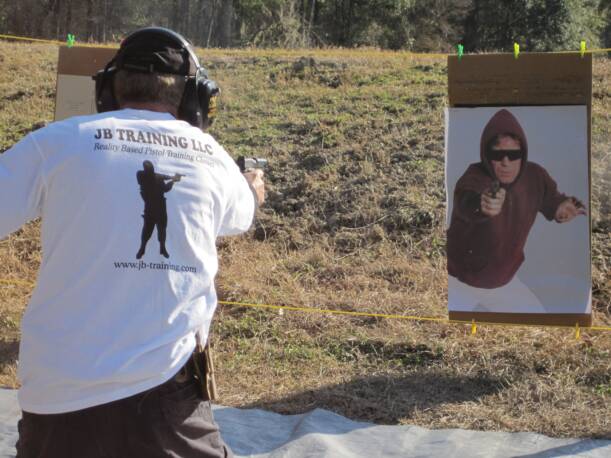You’ve shot someone. You didn’t want to. You had to. It may not have been a perfect shoot. You don’t know; you’ve got too much adrenalin in your system. You can’t think straight. You can’t hear very well. You attacker or attackers are dead, dying or gone. The attack seems to be over. But the incident isn’t over. Far from it. What you do next will determine how much of a nightmare lies ahead . . .
First off, make sure no more violence will occur. Just because the attacker (we’ll use a solitary assailant as an example) is down doesn’t mean he’s out. If he still poses an imminent threat to your life, you may have to use force again.
With your weapon in a low-ready position, scan for threats. Scan everywhere, including up (e.g. second story windows). Tell bystanders to “stand back, he may still be dangerous.” Then order them to “stay here, the police will be here soon.” (You want witnesses.)
Put your weapon away as soon as its safe to do so. Preferably, BEFORE THE POLICE ARRIVE.
If you are not secure—say an antagonistic crowd is gathering around you—leave. Otherwise and in any case, call 911. You should be the first (or at least amongst the first) to call the police to report the shooting.
Just give them the facts.
“I’m on Orchard Avenue next to Pow Science. I was attacked and I had to shoot someone. I’m male,about six feet tall and I’m wearing a blue shirt.”
Either stay on the line or set the phone down.
OK, so, the cops arrive. You do what they tell you to do. Once the scene is secure, they’re going to ask you what happened. Here are the two things you DON’T say:
1. Nothing.
Of course you have the right to remain silent. Yes, anything you say can and will be used against you in a court of law. But the chances are you’re not under arrest. Not yet. If you say “I want to talk to my lawyer” and nothing else, the police will arrest you. They have no reason not to.
Alternatively: “I was attacked. I was in fear for my life. I had to shoot him.” Your position is clear. The police may still arrest you, but at least they know it may have been/was a defensive shooting.
2. Anything else
The police will attempt to extract as much information from you as possible. If they haven’t arrested you, you haven’t been Mirandized. They haven’t told you you have the right to remain silent. Which you have. The police are hoping that you’ll waive that right by not exercising it.
In other words, they’ll ask you a LOT of questions, from the general (“Tell me what happened”) to the specific (“Where were you standing?”) to the technical (“How many shots did you fire?”).
Don’t answer any of them. You’re in no condition to do so. You’re likely to say something inaccurate and, thus, damning. If the police press you for answers, tell them “I’m too upset right now. I’ll be happy to give a full statement later, after I’ve calmed down and spoken to an attorney.”
If the police arrest you, they arrest you. Again, do NOT give the police a statement without consulting an attorney, in private, beforehand.
[The information in this post is based on the video Responsible Use of Lethal Force, available by clicking on the ad on the home page. TTAG paid cash money for this video. We only accept advertising for products and services we consider valuable for our audience.]




